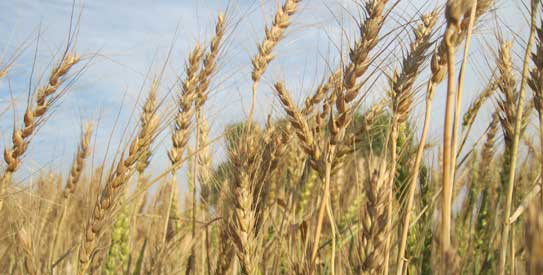
KARACHI: Chief Minister Syed Qaim Ali Shah has said that there is a possibility of lesser wheat yield this year in comparison to the last year’s production and, as such, a strategy should be evolved to achieve the wheat procurement target.
Presiding over a meeting at the Chief Minister’s House regarding procurement of wheat from the 2012 crop and disposal of surplus wheat stocks, he issued directives for the procurement of bardana (jute bags).
He said that the government was doing a lot for the welfare of growers and it was essential that bottlenecks in obtaining bardana by growers were removed at the earliest.
It was decided that 1.3 million tonnes of wheat would be procured from the current crop for which bardana should be arranged.
The meeting was informed that there was a surplus stock of 350,000 tonnes of wheat with the food department.
The meeting decided that the stocks should be supplied to floor mills, chakkies and businessmen at the same rate of Rs2,550 per 60-kg bag.
Regarding provision of pacca platforms for storage of wheat, Mr Shah called for preparing estimates.
The meeting was attended by Food Minister Mir Nadir Ali Magsi, Agriculture Minister Syed Ali Nawaz Shah, Finance Minister Syed Murad Ali Shah, Chief Secretary Raja Muhammad Abbas as well as secretaries and senior officials of the relevant departments.
Flood-hit dykes repair A high-level meeting at the Chief Minister’s House on Wednesday reviewed the progress of development projects being executed by the irrigation department with regard to the reconstruction and repair of flood protective bunds damaged during the 2010 floods in the province.
Chaired by Chief Minister Syed Qaim Ali Shah, the meeting was attended by Finance Minister Syed Murad Ali Shah, Irrigation Minister Jam Saifullah Dharejo, Food Minister Mir Nadir Ali Magsi, Chief Secretary Raja Muhammad Abbas, Additional Chief Secretary (P&D) Israr Malik, Irrigation Secretary Khalid Haider Memon, Finance Secretary Naveed Kamran Baloch and senior officials of the relevant departments.
The meeting discussed liabilities and balance of payments to be made to contractors. It was decided that the irrigation department should forward all bills duly verified by the Nespak consultants.
The chief minister told the meeting that due to the floods there was a state of emergency during 2010 and the irrigation department was directed to restore protective bunds and carry out reconstruction and repair of embankments on the right bank of the Indus River.
Mr Shah called for reconciling all bills within the next three weeks.—APP














































Dear visitor, the comments section is undergoing an overhaul and will return soon.